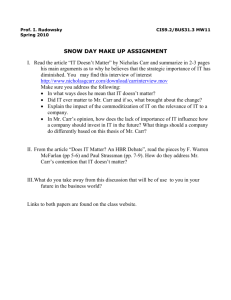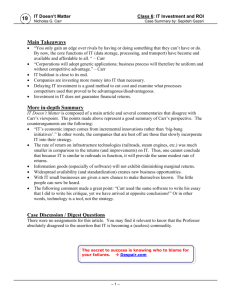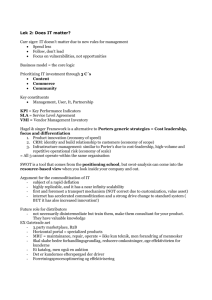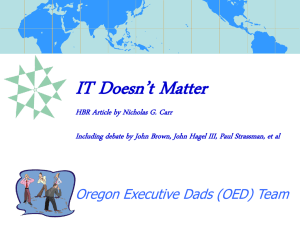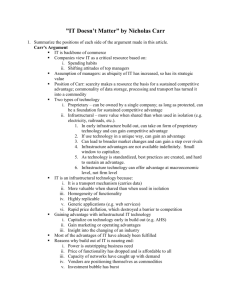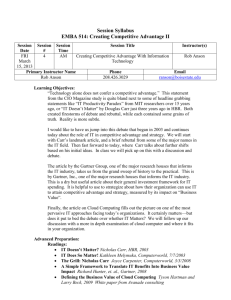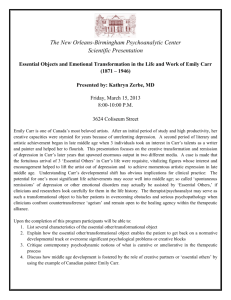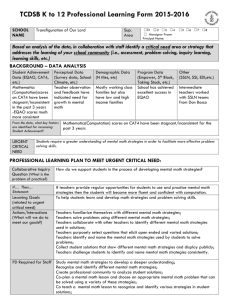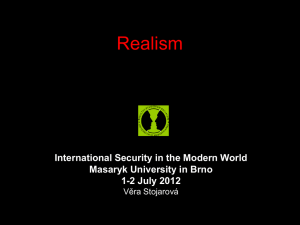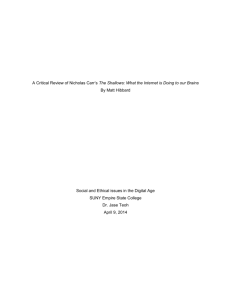Critique of IT Doesn`t Matter
advertisement
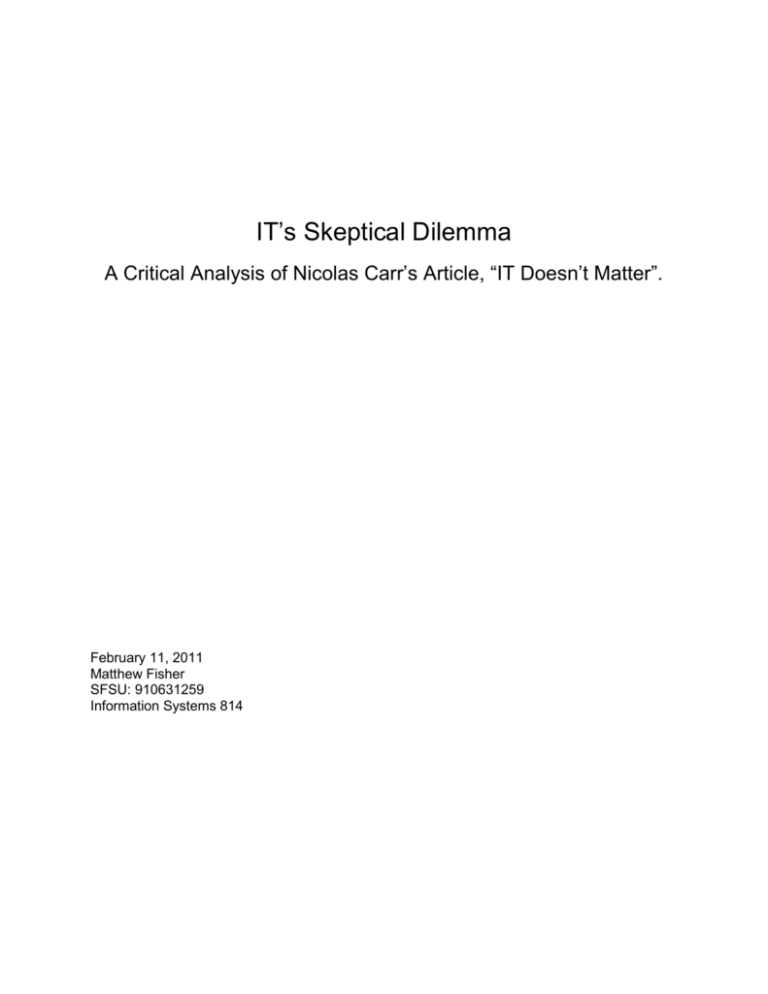
IT’s Skeptical Dilemma A Critical Analysis of Nicolas Carr’s Article, “IT Doesn’t Matter”. February 11, 2011 Matthew Fisher SFSU: 910631259 Information Systems 814 As John Keynes eloquently stated, “The long run is a misleading guide to current affairs. In the long run we are all dead.” serves as an appropriate statement to surmise Nicolas Carr’s assessment of information technology.1 Mr. Carr’s conclusions and analysis, drawn from his 2003 article, “IT Doesn’t Matter”, serves as a philosophical and theoretical framework to gauge the course of technological advantages in the context of a competitive and advancing society.2 After framing the philosophical argument, Carr identifies characteristics and conditions, indicating broad adoption or “build out”, which ultimately lead to the conclusion of technology commoditization that supports IT as a knowledge management tool. The primary premise of the article parses the broad classification of technology into either ‘proprietary’ or ‘infrastructural’ to espouse the limits of a durable strategic and competitive advantage mindset to IT. The axiom of Carr’s argument is that, “the core functions of IT--data storage, data processing, and data transport--have become available and affordable to all,” and provides compelling examples of commoditization parallels of past technology adoption.3 Carr argues that technological advances, either processes or products, deliver a strategic advantage to the extent that it is proprietary, thereby directly rooting it in scarcity. Once a technology ceases to be proprietary, it then begins a process of becoming infrastructural in nature, and thus bearing the characteristics of commodities. The argument concludes by implicitly laying the foundations to view IT as a tool for knowledge management, but Carr never specifically states this point thereby forming the basis for debate. Detractors of Carr’s generalized view of IT as being too focused on the long term is well stated in Ruth Le Pla’s article: IT is a much broader discussion than that. To imply that there's no innovation ahead that's going to offer people the opportunity to differentiate themselves, reminded one of the CEOs I interviewed of a comment by the then head of the patent office in the US in the late 1800s. He looked at submissions for patents for 1 John Maynard Keynes, A Tract on Monetary Reform (London: Macmillan, 1924) accessed 11 Feb 2011, online at: http://www.j-bradford-delong.net/Econ_Articles/Reviews/monetaryreform.html 2 Nicholas G Carr. 2003. IT Doesn't Matter. EDUCAUSE Review 38, no. 6, (November 1): 24-38. http://0-www.proquest.com.opac.sfsu.edu/ (accessed February 12, 2011). 3 Carr, 2003 new inventions and said, 'Wow, people are doing a pretty good job. It looks like everything that's going to be invented has been.'4 While the aforementioned statement points to further innovations, it does not address the argument against commoditization. If IT is viewed as a tool for knowledge management, then Carr’s argument is strengthened. An article by Hansen, Nohria, and Tierney, supports the knowledge management function of IT stating that, “The reuse of knowledge saves work, reduces communications costs, and allows a company to take on more projects. As a consequence, firms such as Andersen Consulting and Ernst & Young have been able to grow at rates of 20% or more in recent years.”5 The article’s IT investment and management recommendations fail to convince due to the focus on stagnation and assumptions that others will drive innovation. Logically, Carr is promoting a position that material factors have no basis in competitive advantage, a position that few would wholly accept. The recommendations also advance a position that a firm should only mimic others, thereby stating an antithetical position to innovation. The entire argument of the article focuses on a meta-view of IT yet shifts to the specific in its recommendations. Carr’s conclusion resonates by shifting the debate from IT to considerations surrounding knowledge management, but fails to explicitly state the conclusion he is supporting. Furthermore, the article identifies IT innovations as a tool to enhance capabilities, but IT itself is not a competitive advantage. Detractors of Carr focus on criticizing the article by utilizing scope shifts to side step his argument and point to new products and tools that could enhance capabilities further. Currently, IT continues to enhance organizational capabilities, and therefore IT does matter. However, IT alone will never deliver an advantage, it is the utilization of knowledge that IT assists to achieves this end. 4 Ruth Le Pla. 2005. Hands Off Hands On - The hard word on hardware and software; Is IT still a strategic resource or merely a functional one? And how should executives manage IT in the future? New Zealand Management, April 1, 38-39. http://0-www.proquest.com.opac.sfsu.edu/ (accessed February 12, 2011). 5 Hansen, Morten T., Nitin Nohria, and Thomas Tierney. 1999. "WHAT'S YOUR STRATEGY FOR MANAGING KNOWLEDGE?." Harvard Business Review 77, no. 2: 106-116. Business Source Premier, EBSCOhost (accessed February 12, 2011).
